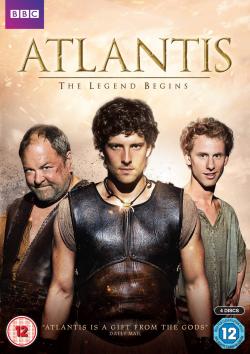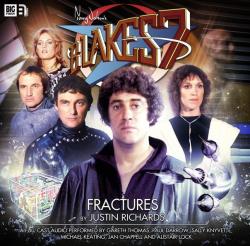Atlantis Season 1
Friday, 21 March 2014 - Reviewed by

Atlantis
1- The Earth Bull
2- A Girl By Any Other Name
3- A Boy of No Consequence
4 - Twist of Fate
5 - White Lies
6 - The Song of the Sirens
BBC One
Released: 10 February 2014
The first aspect which I wish to highlight is the strength of the show's premise. Now in some ways the solid credentials of the production/writing team would make you expect a better sense of direction for a new show than perhaps would be the case otherwise. For myself anyway the core idea of Atlantis is not fully clear or used to its actual potential. The very beginning opens in modern times as Jason (newcomer Jack Donnelly) - in every way a 21st century Englishman - goes looking in the ocean hoping to resolve the mystery of his father's disappearance. Eventually he finds a wreck underwater called 'the Oracle' then wakes up without his modern clothes in the fabled lost city of Atlantis. He quickly acquires the more modest attire of the ancient times and sets about establishing a new home and identity for himself.
There is a lack of clarity over the nature of Jason - is he an explorer from another dimension or really the bona fide Jason of Greek lore? This could have been a clever and exciting character arc but just does not go anywhere meaningful for much of the opening run. Jason is from our time and knows the essentials of Atlantis lore so is in some ways is at an advantage by being so aware of what might/should happen. Yet this is seemingly dropped in favour of a lead who is totally comfortable and familiar with his surroundings by the end of the episode.
In terms of the actual actors and the characters they are given, the show has mixed fortunes. Mark Addy plays Hercules and is back in more familiar territory as the comic relief, after his excellent dramatic performance of King Robert in Game of Thrones. No matter how lacking a storyline may be, Addy can be called upon to liven things up without needing to chew the scenary. Many moments involve Hercules coming out and stealing the scene. For despite being fat, alcoholic and slovenly he seems to be the heart and soul of the show.
Of course apart from Jason and Hercules there is a need for a third character to provide an interesting dynamic. Joining the 'man of action', and the 'past-it rogue' is the 'brains', or Pythagoras - adept at plans and anything remotely complex in mathematics. Played by Robert Emms, this regular cast member is decent enough to watch but rather inoffensive and thus bland when compared to other players. I struggle to remember notable dialogue that he happens to utter, such is the often lacklustre nature of the scripts when it comes to decent characterisation.
Jason is sadly rather weak - the inexperience of the actor being exposed -and relies on better performers around him to make his scenes work. This is especially glaring if the viewer were to compare this show directly with episodes of Merlin - with the excellent Colin Morgan. Even Robin Hood had an agreeable man in Jonas Armstrong. Thus - for the moment anyway -this trio of protagonists are not exactly likely to be the topic that people will be talking about when bringing up their television experiences of the recent weekend.
When looking at characters who appear on a recurring basis, there is more satisfaction to be gained. The Oracle, in a clever link to Jason going down to a wreckage of the same name in the opening sequences, is spookily and mysteriously conveyed by Juliet Stevenson. Even better is the wicked queen Pasiphae. Sarah Parish has done the villainess multiple times before on-screen and is reliably strong. These two actresses certainly know their craft and can add life to even the thinnest of material.
As for others in the royal court, King Minos (Alexander Siddig) has a striking visual presence but lacked a bit too much regal charisma for my liking. He is also somewhat conveniently made to look slow by all the politicking and scheming going on close to him. Ariadne (Aiysha Hart) the immediate heiress to the throne is probably the most average of the cast. She sports an appropriately 'Mediterranean princess' look and has some decent delivery but her scenes never transcend the forced plot developments that take places as one episode follows another. However she seems to get some more expressive reactions out of Jason such is their budding love story. Nonetheless I would prefer that the main lead was bringing a bit more magic to these important one-on-one scene. Donnelly certainly has the looks that would interest a princess, but he seems just a bit passive and unsure of himself.
Elsewhere in the cast, Medusa is very well played by Jemima Rooper as a girl next door with some real courage. In a welcome example of good character interaction, she brings out the best, most meaningful aspects of Hercules. Anticipating her inevitable tragic fate does evoke some bittersweet emotions almost immediately, as the viewer must accept that her capacity for good is to ultimately be subverted for great evil. For those looking for female characters to be proactive and relatively independent, Atlantis builds on the fine examples that Merlin set. Medusa is often needed for help, rescue or just some sage advice.
Another good supporting player that more than looks the part is Oliver Walker as Heptarian. He is just one notch down from the supremely wicked queen in the 'despicable enemy' league, and is a worthy combatant and thorn in the side for the main heroes. Yet even this positive is tainted by the impression that Walker would have probably done a better job than Donnelly as Jason.
In terms of other strengths, there is much soundness in the production values. The show is often lit in bright sunshine such is the warm island setting, or shrouded in atmospheric darkness due to night time or events in unknown caves. Many viewers can pick up on an overall atmosphere that is breezy and mild. The lack of being tied down by historical accuracy means that there is scope for some variety of story and events can proceed differently to what had long been accepted by readers of these myths. Sets and costumes are good, and most of the effects are perfectly acceptable for modern TV and don't take viewer out of the experience.
There are however arguably more weaknesses in this opening run which threaten to drag the show down into unwelcome mediocrity. For one, the potential that exists from the basic variety of stories is not fully harnessed and a lot of formulaic or clichéd stuff happens just a bit too often. Jason seems to have an alarming lack of judgement and sense of how to learn from his errors, although he is not the first protagonist to lack judgement in serial format entertainment. There is a tiresome pattern where he antagonises a guest character which leads to some form of mission, such as retrieving an item, protecting someone or ending the threat of some dangerous beast. The sense of jeopardy coming from the royal court with King Minos being an obstacle for seemingly 'right' reasons, and Pasiphae developing into a very powerful threat is key. However in the vent this supposed tension still plays out at times with a curious lack of oomph.
Although the settings and filming is decent enough there is far too much blurring or overlap, whereby it seems practically every episode has a wander through generic woods or a bit of 'stealth' under cover of darkness. Even more tiresome is the forced humour . While often funny, even Hercules can cause the viewer to cringe at times. One example being his description of a fellow prisoner as 'the man with the three wives [who] knows what I talk about'. This joke is fine for a fundamentally comic storyline, but the context of the actual episode is rather grim. And in the process it adds nothing to a one dimensional supporting character - of which there are plenty in the larger guest cast. This becomes a constant issue with the series - for a light entertainment show there is too much uncertainty just how to blend the less intense moments with the more harrowing ones and that is quite a disappointment given the creative team's past good work.
If things are not forced then they are clichéd half the time. Ariadne often clashes with Pasipahe over her transparently wicked intentions, offering barbed wit. No quarter is given or taken, but the writers certainly did not take long to throw out some tired lines more suited to a catfight in a 1980s 'supersoap'. Any opportunity to hint or provide interesting clues over just what happened with the late wife of the king and birth mother of Ariadne is rather glossed over. Minos clearly is a more modest role than Pasipahe but more could have been done to flesh out his character whether he is onscreen or not. With the lack of information, the audience is forced to fill in blanks relying on conventional step-mother/second wife tropes. There is opportunity though for this to be rectified in later episodes, but would require some care and attention from the writers.
Many BBC TV shows boast music that helps to make the show more effective Atlantis' musical dimension sadly reaches an unremarkable level. Every 'plot development' is seemingly telegraphed and the humour is often surrounded by a dirge of musical 'slapstick'. Mainly contributed by Rob Lane with some work coming from Rohan Stevenson, this is another element which can be improved upon. Perhaps more dynamic scripts would garner better creative input from the music department.
Despite all my issues in general, out of the opening six instalments, only two were real let-downs, i.e. 'A girl By Any Other Name' and 'Twist Of Fate'. The opener was intriguing and well-paced and in my opinion should be mimicked in later episodes for vibrant themes and character momentum. The third and fifth episodes are very enjoyable for the most part, with the sixth being decent enough and bringing some much needed tension as future plot developments look to be rather ominous for the kind-hearted central trio.
In summary Atlantis is arguably a show with just as much, if not more, potential than Merlin, with its options for exotic lands and a variety of human and animal foes, as well as crafty intrigue in the royal court. For now the overall hit-and-miss in terms of story quality is a big hurdle. Even the better episodes can lack depth, as the scripts often trot out average dialogue, and miss out on numerous thematic and 'moral lesson' aspects. The show feels less than the sum of its parts, as bits and bobs of Minoan civilization are pulled together and most episodes are self-contained and could be watched in different order, such is the loose season arc. For any proper momentum to be generated, this show will need more work from almost everyone concerned to match the fine efforts of Mark Addy and a few of those that provide supporting roles.





